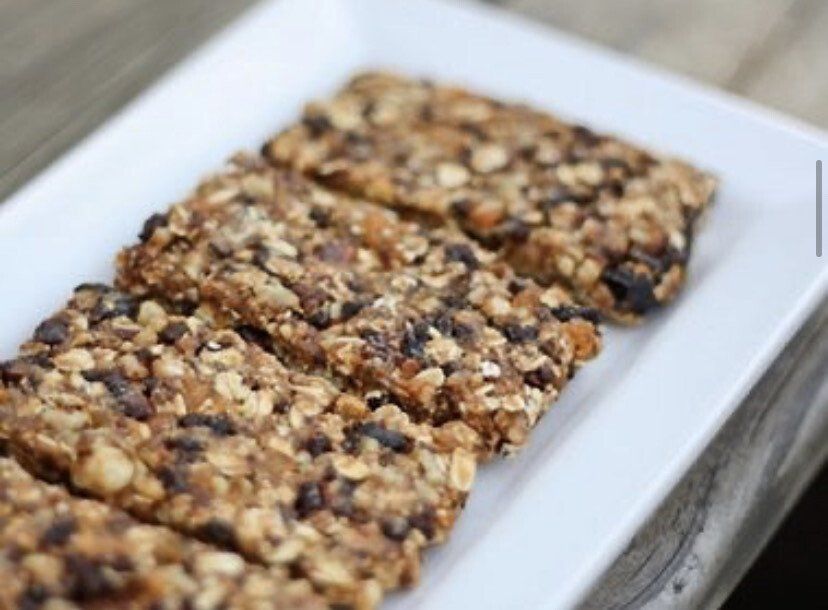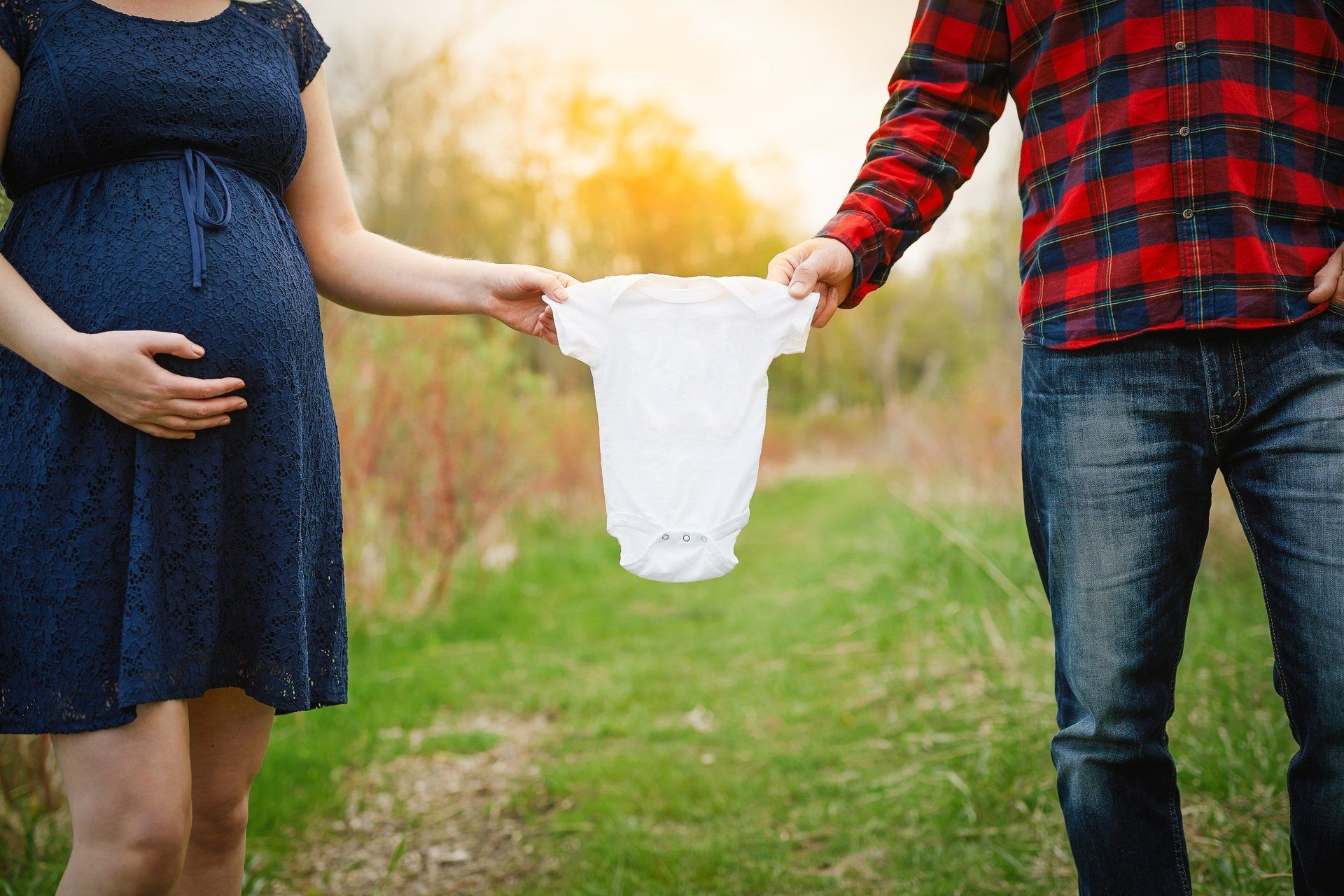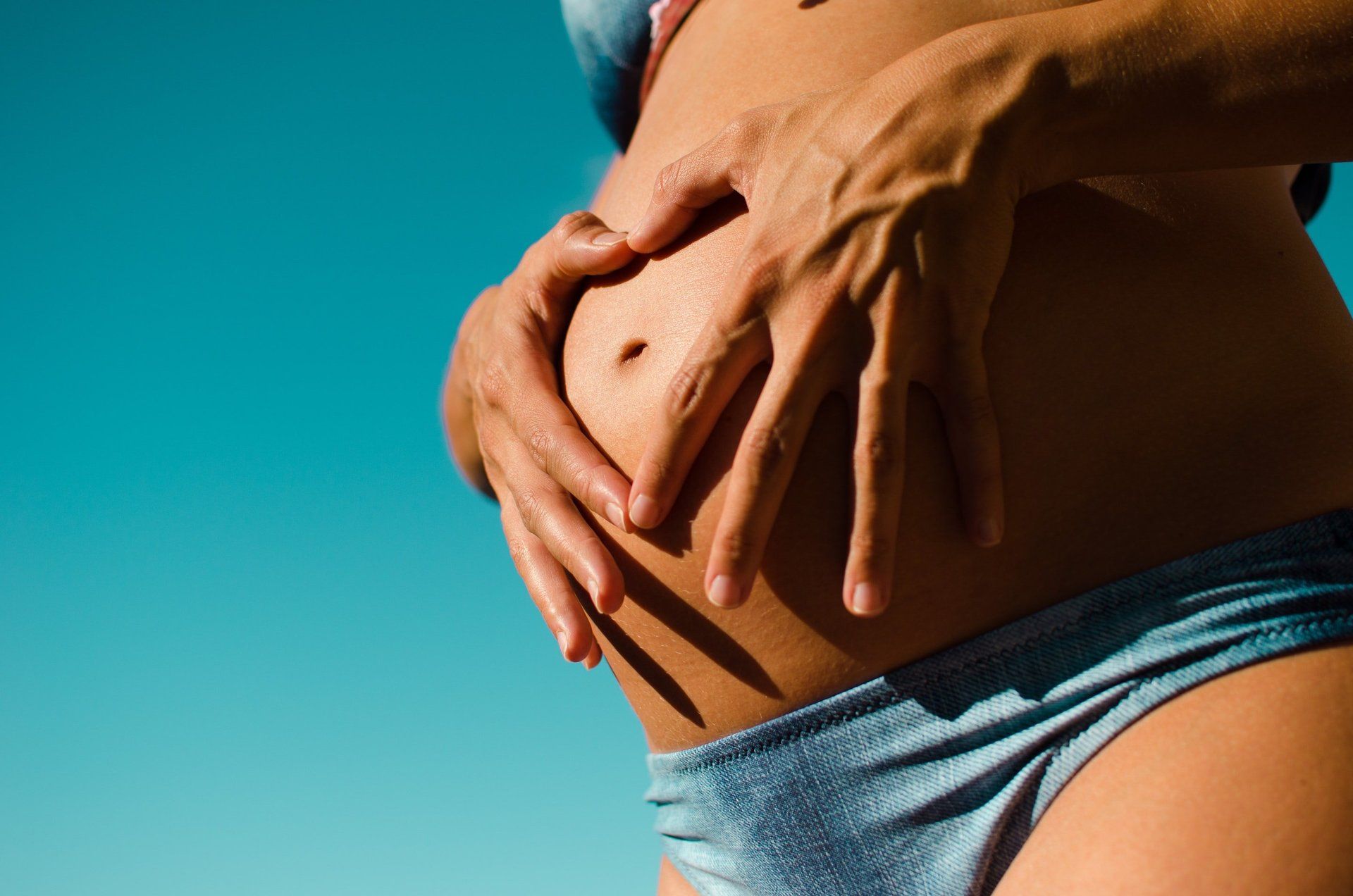Busting Exercise Myths When It Comes To Pregnancy
August 6, 2020
If you are reading this it more than likely means that you are pregnant!!
HUGE CONGRATULATIONS!
However are you concerned about what you should or should not be doing?
You can go online and see what is what but this can be a minefield when it comes to pregnancy, there are so many conflicting articles out there: I am here to help put some of those to bed and your mind at rest.
When it comes to pregnancy, your health and fitness should go hand in hand with that.
Women used to be afraid of training during pregnancy; we were told that we had to rest up and that any kind of exercise was bad for us.
This is not true at all and exercise during pregnancy actually provides a great number of benefits:
• Improved circulation
• Reduced swelling
• Reduced leg cramps
• Reduced muscular discomforts
• Easier, shorter labours
• Help to maintain fitness
• Improved body awareness
• Quicker post-natal recovery
• Eased gastrointestinal discomforts
• Reduced maternal weight gain
• Reduced labour pain • Reduced risk of lower back pain
• Offset postural imbalances
• Better self-image
Some of you may have already been exercising before you found out you were expecting, some of you may not have done any sort of physical exercise beforehand, so let's first of all debunk some of those myths around exercise and nutrition.
Myth 1: If you haven't exercised before you got pregnant, it is not a good time to start.
Truth: Pregnancy is the perfect time to get active, I have not come across anything in a medical journal where is says exercise such as walking is unsafe. The thing that you should be worried about is not being active as inactivity can lead to excess weight gain and high blood pressure. Experts agree, when you're expecting it's important to keep moving: Pregnant women who exercise have less back pain, more energy, a better body image and, post-delivery, a faster return to their pre-pregnancy shape.
Myth 2: You should not lift weights while pregnant.
Truth: Now, this IS dependent on the person. I would not tell one of my clients who had never picked up weights before to start squatting and deadlifting 50 kg but if you are use to lifting weights, then carry on doing so. If you are new to weights you can still pick them up but just ensure you perfect the best technique through watching the videos - See my membership site or ask a qualified trainer and choose a weight that is not going to cause you any discomfort. If you are unsure at all seek medical advice before exercising.
Myth 3: You need to stop exercising as intensely.
Truth: I don't recommend sprinting the 100 metres time and time again but you can maintain the programme you were following beforehand as long as your doctor or midwife gives you the all clear to do so. If there are no complications us ladies can continue to exercise to a high level throughout our pregnancy. You know your body better than anyone so be aware of how you are feeling throughout your exercises and act accordingly. In early pregnancy raising your body temperature can be damaging to your little one, so ensure you keep those fluids in - don't exercise in the heat to the point where you are that out of breath that you can't talk! Make sure you can talk comfortably when exercising and if you do have days when you don't feel as energetic just take a day's rest! Listen to your body!
Myth 4: Running is a no go area.
Truth: Your little bundle of joy is safely tucked inside you while you are jogging away so as long as there is no pain in your joints and ligaments you should continue running. While pregnancy isn't the time to start training for a marathon, experienced runners can continue running, as long as they stick to level terrain (to reduce the risk of falls) and limit the distance if they feel tired. Eventually though, even people who run marathon as forced to stop running due to the discomfort in the later stages of their pregnancy. If this is the case, just swap to the cross trainer.
Myth 5: You should not work your abs.
Truth: This is a topic I wanted to touch upon as I have been asked this so many times. Doing crunches and sit-ups on your back is a no go area after your first trimester. Your uterus will be growing and can compress the vena cava, the major vessel that returns blood to your heart, which can in turn make you feel dizzy. If you want to work your core there are still a number of ways that you can do this; you can do the plank, which is a GREAT exercise and you can do this until your tummy touches the ground! Another is standing up and inhaling and drawing your naval towards your spine. Yoga and Pilates are highly recommended through pregnancy but as always check with your doctor and midwife first. You will be glad you worked your core when it comes to labour believe me!
Myth 6: You should eat for two.
Truth: This is one of the top excuses I hear for eating more during pregnancy, Yes, you're eating for two but that doesn't mean two adult-sized servings are necessary. The average woman with a normal weight pre-pregnancy needs only about 300 extra calories per day to promote her baby's growth. That's roughly the number of calories in a glass of skimmed milk and half a sandwich. A woman of normal weight should gain 25 to 35 pounds during pregnancy -- less if she's overweight. It's difficult to drop extra pregnancy pounds after birth. Also, women who gain more than 50 pounds when they're carrying just one child have a higher risk of a caesarean section or a difficult vaginal birth
I hope this puts your mind at rest and of course, if you have any additional questions please get in contact with me.
Much love
Lydia

Snacks to eat when breast feeding. As a breastfeeding mum, there isn't a moment in the day that your body isn't actively making milk for your little one. Many mums can feel constantly hungry, and this hunger comes from the amount of calories that your body uses making each ounce of milk. It is important you are eating enough calories and the right food! Fueling your body with nutrient-dense foods that help replenish it with everything it needs is imperative. Eating a variety of nutritious whole foods will help you feel and stay healthy and energised. A great go to are nuts they are high in essential minerals such as iron, calcium, and zinc as well as vitamin K and B vitamins. They are also a healthy source of essential fatty acids and protein. So give this fruit and nut bar a go! * 1 cup chopped dried apricots * 2 cups of chopped and pitted Medjool dates * 1/2 cup pumpkin seeds * 1/2 cup roasted unsalted cashews * 3 tablespoons of flax meal * 1/8 teaspoon of salt * 1/2 teaspoon of cinnamon 1. Combine chopped dried apricots and Medjool dates in the food processor and process until well combined. 2 . Now add ½ cup of roasted, unsalted cashews, flax seed, pumpkin seeds, salt, cinnamon and pulse until you get a sticky mixture. 3 . Line a baking dish with parchment paper, transfer the mixture to it and flatten to get an even layer. Refrigerate for an hour or until firm. 4 . Cut into bars or squares and serve. Are you a busy mum who wants to feel good about themselves? Why not try our breast feeding plan. Please get in contact with me for more information

Congratulations and welcome to motherhood! You may be reading this as a first time mum or maybe you're a seasoned pro? Whatever your situation, it is always daunting! There is no right way or wrong way on how to feed your newborn when they are born. A fed baby is a happy baby, I breastfed my first baby but my second child I decided to bottle feed. Deciding how you will feed your baby is a decision that every mum undertakes, at the end of the day you have to do what is best for you and your little one. If breastfeeding is what you have chosen to do, let's talk about what you have to take into consideration There are a few components you need to remember. Drinking fluids Ensuring that you drink enough water is super important, why? As drinking enough water, is not only beneficial to you it will also help you maintain a good supply of milk for your little one. It is advised to drink 3.8 litres of water a day, this will help you hit your daily limit. I suggest to my mums that it is good to keep a large bottle of water next to you, as you can just grab and go with it. Having it next to you will enable you to keep you on track and you are less likely to forget to drink it! When you give birth the priority is you and your baby. You can begin your core and pelvic floor work straight away ( C section may differ) , for examples of exercises you can do please look at my Instagram www.instagram.com/lydiarees Doing this is going to help you in everyday life, from posture when breastfeeding to picking up and putting down your little one. Once you have established a good milk supply and your thoughts turn losing your baby weight ( do not put pressure on yourself!!!) you can look to change your calories slightly after the six week mark. "How do you lose weight without it affecting your milk supply?" You can still watch what you eat and exercise without your milk supply being affected, however, you need to take a few things into consideration. First and foremost it is super important that you have a well balanced diet consisting of whole foods. Hitting your protein target is also super important, as your body is recovering from pregnancy and also providing nutrition for a rapidly growing baby. A breastfeeding mum should consume about 50 grams of protein or more per day Eating enough calories is imperative. You can eat at a calorie deficit while breastfeeding, HOWEVER, you must account for the calories spent making milk. Your body uses between 300-500 (roughly) calories a day making milk, and if you are also eating too few calories, it can have an adverse affect on your supply. For example, if you calculate your calories to be 1500 for weight loss, then you should then add an additional 500 calories to this calculation, putting you at a goal of 2000 calories. My Breastfeeding plan will help you calculate your calories and provide you with a tailored plan full of nutritious meals for you. Overall, listen to your body mum knows best! Have any questions, drop me a message.

Mummy tummy Incontinence Bloating These are a few subjects that sometimes get skipped over after having children but I think it is super important to address them, rather than suffer in silence. When I had Louis no one really warned me that jumping on a trampoline would be a no go area, it wasn't until I did I realised o h we have a problem here. I also looked pregnant months after giving birth, which I could only describe as a pooch! Can you relate? Do you still look pregnant months after giving birth? If this is the case you may have a Diastasis Recti. This is when the rectus abdominis muscles ( aka your six pack muscles ) in your abdomen separate during pregnancy, leaving a gap that allows your tummy to pooch out. After pregnancy, Diastasis Recti looks like a ridge or even a dome from your midline How Do I Know if I Have It? You may still look pregnant You may suffer from incontinence You may suffer from lower back pain It's easy to perform a self-test for diastasis recti. Just lie on your back with your knees bent and feet on the floor. Put one hand on your belly, with your fingers on your midline at your navel. Press your fingertips down gently, and bring your head (shoulders about an inch off the ground ) up into a mini crunch-like position. Feel for the sides of your rectus abdominis muscles, and see if and how far they are separated. Separation is commonly discussed in terms of finger widths -- for instance, two or three (or more) fingers' separation. If you can feel a gap then you have it, Good news is that you can work towards repairing it 😀 I have helped hundreds of women strengthen their core and pelvic floor muscles. There are simple exercises that you can do as soon as you are given the all clear to do so by your midwife or doctor. Doing exercises like crunches and planks can do more harm than good. You want to do gentle exercises to work your deep core muscles. My Instagram has a multitude of DR safe exercises. Click here to view them www.lnstagram.com/lydiarees If you have any questions please hit reply and I will be more than happy to answer them. PS. join my Restore your core plan which has a six week core programme to go along side a tailored nutrition and exercise plan.

Every week we hear of a new diet that will help you get the results that you want. When it comes to fad diets they all give you the promise of a quick fix and the results that you want, one day it will be the paleo diet the next day a greens diet, only to find it is something else the following week. "Get rid of your tummy flat" "Cut out carbs and see the results you want!" "Fast for 72 hours" Do not get me wrong when it comes to eating, everyone is different. It is important to find a plan that you are going to be able to stick too. You want to find a balance in your health and fitness, eat enough nutritious food to fuel your body to get the results that you want, without your restricting yourself. This is what my Restore your core programme is designed to do. You won't need to bother with a fad diet again, my plans range from healthy smoothie recipes to having a Galaxy bar as a snack! My fat loss meal plan has you covered, not to mention my home and gym training programmes that will help you get the body you desire as well as helping you restore your core and pelvic floor muscles after having children. Are you tired of starting over and over again? Get a plan that fits around your lifestyle Do you want to try my plan for three days for FREE? Click below for more information to see how we can help

It is your first trimester, you may be feeling like crap, that is ok. First and foremost do not beat yourself up for not keeping active or eating bags of crisps if its the only thing you can stomach. IT IS OK!!! However, if you are feeling good within yourself, it's great to keep active! Why do I encourage all my clients who are pregnant to keep active during their pregnancy? I tell all my clients and those who come to me for advice that it is an extremely positive thing to keep active during your pregnancy. If you have been exercising beforehand you can continue to do this, however please take on the following advice. If you have a high-risk pregnancy, speak with your doctor or your midwife before performing any sort of activity. When it comes to exercising: • Be careful not to overheat when training • Try to avoid contact sports • Listen to your body, you know how much you can push yourself and stop if you feel uncomfortable or something doesn't feel right • Keep fluids in. Exercising can lead to sweating, so make sure you have a drink and keep hydrated throughout your activity • Ensure you warm up and warm down In the first trimester, you may be feeling tired and prone to feeling faint when getting up due to low blood pressure, this is normal but just be aware of it when you are training. You may feel tired, sick or both and that you really don't have the energy to do anything. If that is the case, PLEASE do not beat yourself up about it. Hitting the gym, or doing a home workout may be the last thing on your mind - even if you can't face doing that try and get outside and go for a gentle walk, go swimming or try Yoga and go at your own pace. As I mentioned before in a previous blog, I was one of those annoying people who did not experience any symptoms, which can be stressful in itself but if you do feel run down and tired there isn't a lot you can do about it, unfortunately. You just have to keep faith that as the time goes on you will get better. I have a friend Carly who is currently pregnant and cannot keep anything down bless her. Her food has consisted of toast and more toast; if this is you just know that it will get better, just hang in there. For those of you who have exercised prior to finding out you were pregnant, you can still continue to do so, with some slight modifications. Always ensure that you warm up and down, this is essential for you, and should be a mixture of a gentle walk and stretching. The hormone Relaxin will also start to come into effect, making you more flexible so it is important not to overstretch past your normal range of motion during exercises. I hope this has brought you a little peace of mind, as always do not hesitate to get in touch if you want any additional advice. Lydia Rees Fitness x

So you have found yourself pregnant, huge congratulations! I know that some of you may be feeling a little overwhelmed, this was the first thing I felt when I found out I was pregnant, coupled with excitement and a little bit of anxiety. The best thing you can do is embrace what is happening inside you, it is a gift and it is a journey that will give you joy, tears, nerves and excitement. I didn't stay active during my first pregnancy so with my second one I understand the importance of exercising throughout ( if possible) When I had Louis I didn't exercise at all throughout my pregnancy and it took me a long time to get back into shape, when I was pregnant with Tripp, I kept active throughout and I feel that reflected in the way I felt through each pregnancy and dafter giving birth. First and foremost get the all clear to exercise from your GP or midwife. I feel it is imperative to keep active throughout your pregnancy; be it a walk, swim or a jog, you are now being fit for two. In the first trimester this is when you may feel at your worst, there are amazing changes that are happening to your body and while your bump may not be showing yet, you will feel the symptoms that go along with it. You will be feeling hormonal - as the number of hormones including oestrogen, progesterone and HGG increase it may lead to a range of changes emotionally. Physically you will feel tired and may also feel sick. I was one of those annoying people who didn't get any symptoms and although this is a blessing, it does have a flip side as I was constantly worrying as I thought "why am I not feeling anything", and this caused me to have concern, but come the 12 week scan I had a little baby wriggling inside of me and all worries were diminished. It is important to remember that everyone is different and no two pregnancies are the same, if you do have any concerns at all you should speak with your doctor or your midwife. Now is the perfect time to fuel your body with good nutritious food and stay active. It is an exciting time ahead, you are growing a little person or persons inside of you. Lydia Rees Fitness x

When it comes to pregnancy, your health and fitness should go hand in hand with that. Women used to be afraid of training during pregnancy; we were told that we had to rest up and that any kind of exercise was bad for us. This is not true at all and exercise during pregnancy actually provides a great number of benefits: • Improved circulation • Reduced swelling • Reduced leg cramps • Reduced muscular discomforts • Easier, shorter labours • Help to maintain fitness • Improved body awareness • Quicker post-natal recovery • Eased gastrointestinal discomforts • Reduced maternal weight gain • Reduced labour pain • Reduced risk of lower back pain • Offset postural imbalances • Better self-image Some of you may have already been exercising before you found out you were expecting, some of you may not have done any sort of physical exercise beforehand, so let's, first of all, debunk some of those myths around exercise and nutrition before we get down to business. Myth 1: If you haven't exercised before you got pregnant, it is not a good time to start. Truth: Pregnancy is the perfect time to get active, I have not come across anything in a medical journal where is says exercise such as walking is unsafe. The thing that you should be worried about is not being active as inactivity can lead to excess weight gain and high blood pressure. Experts agree, when you're expecting it's important to keep moving: Pregnant women who exercise have less back pain, more energy, a better body image and, post-delivery, a faster return to their pre-pregnancy shape. Myth 2: You should not lift weights while pregnant. Truth: Now, this IS dependent on the person. I would not tell one of my clients who had never picked up weights before to start squatting and deadlifting 50 kg but if you are used to lifting weights, then carry on doing so. If you are new to weights you can still pick them up but just ensure you perfect the best technique through watching the videos - See my membership site or ask a qualified trainer and choose a weight that is not going to cause you any discomfort. If you are unsure at all seek medical advice before exercising. Myth 3: You need to stop exercising as intensely. Truth: I don't recommend sprinting the 100 metres time and time again but you can maintain the programme you were following beforehand as long as your doctor or midwife gives you the all clear to do so. If there are no complications us ladies can continue to exercise to a high level throughout our pregnancy. You know your body better than anyone so be aware of how you are feeling throughout your exercises and act accordingly. In early pregnancy raising your body temperature can be damaging to your little one, so ensure you keep those fluids in - don't exercise in the heat to the point where you are that out of breath that you can't talk! Make sure you can talk comfortably when exercising and if you do have days when you don't feel as energetic just take a day's rest! Listen to your body! Myth 4: Running is a no go area. Truth: Your little bundle of joy is safely tucked inside you while you are jogging away so as long as there is no pain in your joints and ligaments you should continue running. While pregnancy isn't the time to start training for a marathon, experienced runners can continue running, as long as they stick to level terrain (to reduce the risk of falls) and limit the distance if they feel tired. Eventually, though, even people who run a marathon as forced to stop running due to the discomfort in the later stages of their pregnancy. If this is the case, just swap to the cross trainer. Myth 5: You should not work your abs. Truth: This is a topic I wanted to touch upon as I have been asked this so many times. Doing crunches and sit-ups on your back is a no go area after your first trimester. Your uterus will be growing and can compress the vena cava, the major vessel that returns blood to your heart, which can, in turn, make you feel dizzy. If you want to work your core there are still a number of ways that you can do this; you can do the plank, which is a GREAT exercise and you can do this until your tummy touches the ground! Another is standing up and inhaling and drawing your naval towards your spine. Yoga and Pilates are highly recommended through pregnancy but as always check with your doctor and midwife first. You will be glad you worked your core when it comes to labour believe me! Myth 6: You should eat for two. Truth: This is one of the top excuses I hear for eating more during pregnancy, Yes, you're eating for two but that doesn't mean two adult-sized servings are necessary. The average woman with a normal weight pre-pregnancy needs only about 300 extra calories per day to promote her baby's growth. That's roughly the number of calories in a glass of skimmed milk and half a sandwich. A woman of normal weight should gain 25 to 35 pounds during pregnancy -- less if she's overweight. It's difficult to drop extra pregnancy pounds after birth. Also, women who gain more than 50 pounds when they're carrying just one child have a higher risk of a caesarean section or a difficult vaginal birth. I hope these have helped you, I know it can on times seem a little daunting but I am here to guide and support you. If you have any other questions or queries please feel free to contact me, I am more than willing to help you. Lots of love

How many times have you said to yourself (make sure you're honest), “There is no way I can do that! Why do bad things always happen to me? I will never meet a decent guy because... I will never get fit and healthy because... I will always be this way because its..... I will never be happy until I hit a certain number on the scales...” Do you find yourself making excuses for why you can't do things in life? Do you find yourself playing the victim because you have always thought that way and don't know how to think another way? I have said all of the above! Believe me, I have come up with every excuse in the book for why I shouldn't do something or how I could get out of doing something! I used to constantly tell myself that nobody understood and that they just didn’t get it. No one understood why my eating disorder was the way it was. No one understood that I had to make excuses that I couldn’t exercise because I worked full time and had kids. I believed I couldn't get where I wanted to with work, as my ADHD stopped me from focusing. I told myself I would never meet a good guy, as I seemed to always go for exactly the same types! I would always see things as an uphill battle and I was constantly fighting against myself! However, I was the only one who was putting myself in this position! I would choose to wake up and see things this way and be the victim of my own circumstances, rather than take control of what was going on in my life. One day I woke up and realised that I had the choice to make small changes to my life and make it a happier place to be! We can tell ourselves day after day why we can't do something, but you know what? All we are doing is reinforcing this to ourselves making it harder to make that change. One of my favourite quotes is, " You have no obligation to be the same person you were five minutes ago." Every single moment of every single day is a chance to start over and be the person you want to be. Having spoken with some of you, I know that is how you feel, so that’s why I am excited to tell you that I have broadened my team and have brought on a lifestyle and confidence coach who will be supporting all my ladies with: Mindset work Mental health work Confidence work Teaching YOU how to love the person you are! (I will be posting a blog by this amazing lady at the end of the week.) Do YOU ... Want to start exercising again? Want to feel happy and confident within yourself? Feel happy and healthy? Have a good relationship with food and exercise so you can get the results you want? Now is the time. REPLY with ‘I am in’ to get more details of my amazing programme. You get to decide how your life turns out, sometimes you just need a little extra help! NOW is your time, With love

Time and time again I get asked questions about how to get rid of your mummy tummy, especially after you have had a C section. I didn’t have a c section but hundreds of my clients have had them, so it what I wanted to address on todays blog. Although it is super amazing and a miracle what our bodies have done , the majority of us hope that we can get back or improve how we looked pre baby, be it aesthetically or physically. When you have a C section it takes a toll on your tummy and also your pelvic floor , what is the best way to regain your strength, exercise. Combine that with eating the right foods and you will feel better in no time. First things first, after a c section, you can’t expect to heal as quickly as those who have a natural birth, so lets take it easy to start off with. Getting your steps in are SO underrated and I can not say how important it is to get moving as soon as you are physically able to, even if it just getting out and going for a walk with your little one. One of the best cardio exercises for C-Section mums is getting out and about and all those steps add up, you do not want to go in full force and risk injuring yourself or putting pressure on the incision. Another gentle exercise is to do swimming and your will rack up those calories too! However, do not push yourself too hard and, as always, please wait until you are cleared by your doctor to start ANY exercise regardless, it is also wise to check to see if you have had any sort of abdominal separation, a simple way to do that is to watch a short video. So once you have had the all clear, your scar seems to be healing nicely, add these exercises into your weekly regime along side getting those all important steps in. 1.Stand ups This exercise will work your thigh muscles and buttocks, but your main focus should be on squeezing and lifting the pelvic floor. Sit on a chair with knees and feet at hip width, back straight and arms out in front of you. Exhale: Simply stand up but as you do so, perform a pelvic floor muscles contraction and squeeze your glutes as you push through the back half of your feet. Draw your stomach up and in and keep the movement under control (this is harder to do than it seems!). Inhale: Stand tall, strong and stable. Exhale : Lower yourself back down to the chair, again under total control and whilst performing a pelvic squeeze. Reps: Up to 10 (Doing fewer reps properly will be more beneficial than doing more rushed reps) Sets: 3 Avoid : Jerking up too quickly with momentum. Tipping forward over your toes. Arching your back. Sticking your head out. Tightening up your shoulders. To make this exercise harder, you could raise your arms to vertical as you stand up. For an extra challenge, have them up the whole time (always forming a straight line from hips to hands.) 2. Glute bridge plus vertical arm lift: Lie on your back, knees bent. Squeeze and lift pelvic floor muscles. Exhale : Using glutes, lift hips up to form a straight line from knees to chest whilst also raising arms up to vertical. Try to keep hips central throughout the lift. Inhale : Hold stable at the top. Exhale : Gently lower hips and arms back down without any movement from side to side. Don’t rush. Reps : 10 Sets : 3 3. Exercise ball - arm and core workout Sit on an exercise ball (or the edge of a chair if you don’t have one) with legs at hip distance or a little wider. Keep pelvis central, back and neck straight and long, and core stable. Raise arms out to the sides and draw small, controlled circle whilst keeping the rest of the body strong and still. Perform a pelvic floor squeeze each time you exhale. Change direction and repeat. Try with palms facing up sometimes and down other times. Exhale : Bring arms forward until hands touch and press palms together as you perform a pelvic floor muscles squeeze. Inhale : Open arms out again into a gentle chest stretch. Reps : 10 - 20 in each direction Modified cobra Lie on your stomach with your palms flat next to your shoulders. Your elbows should be tucked into your rib cage. Lift your head and neck off the floor, but not so much that it strains your lower back. Suck in your navel as if you were trying to lift your pelvis off the floor. Return to starting position. Reps 10 sets 3 For my full 6 week core and pelvic floor e big please click here. Much love


